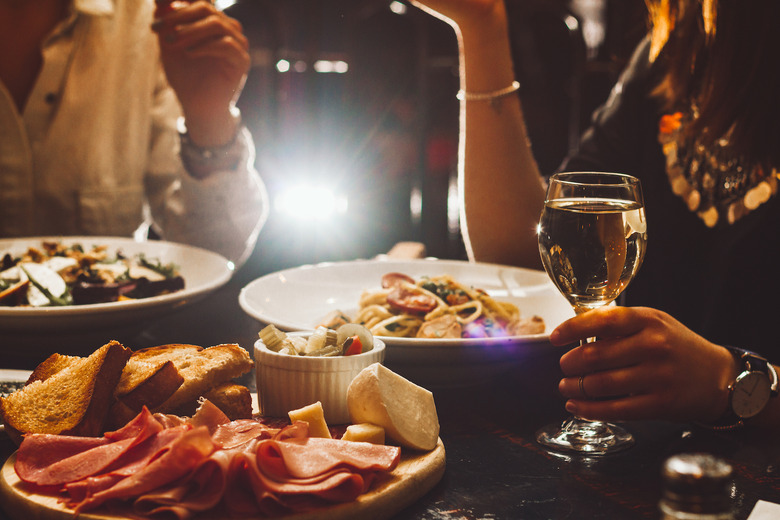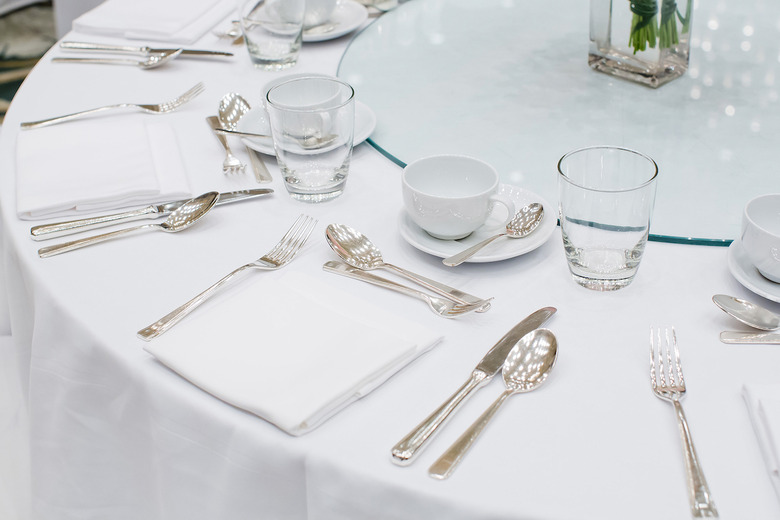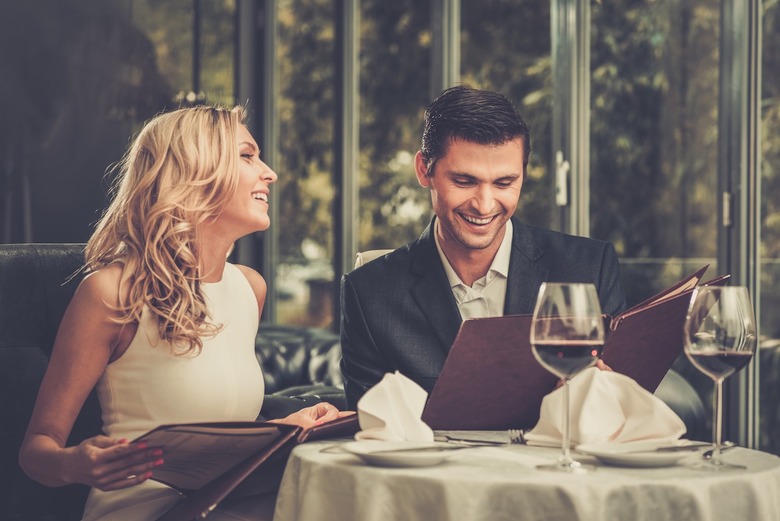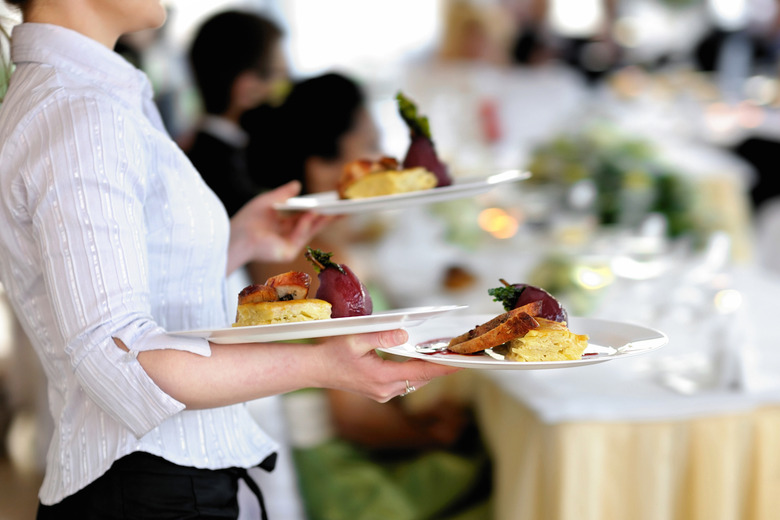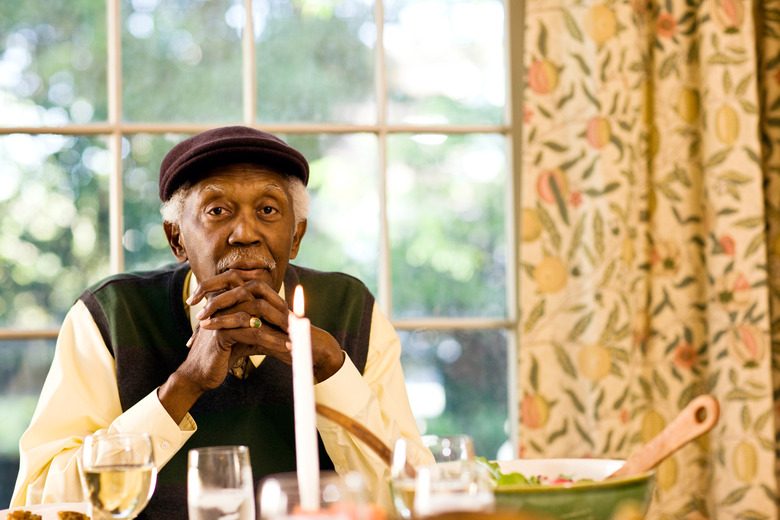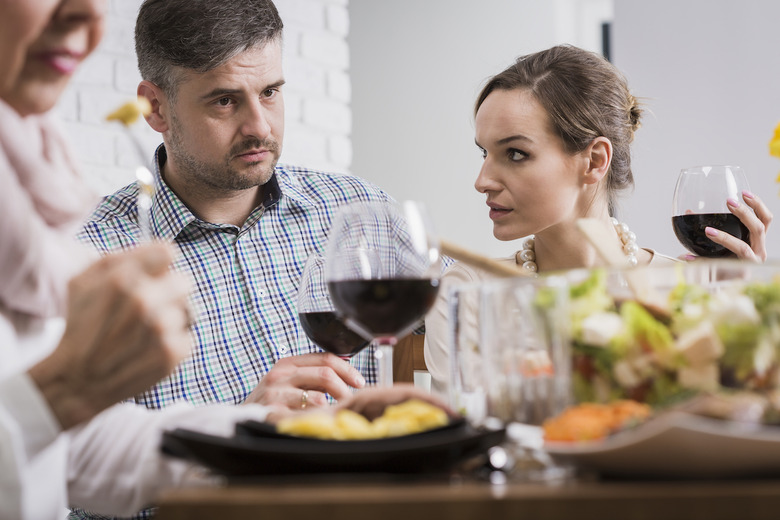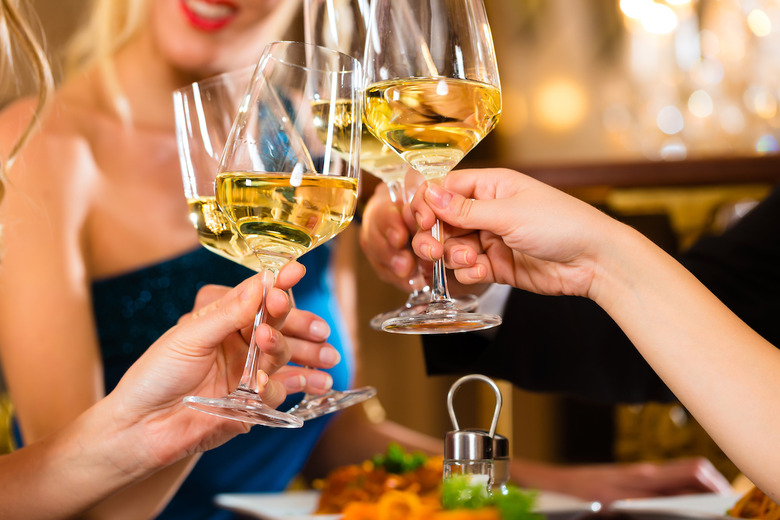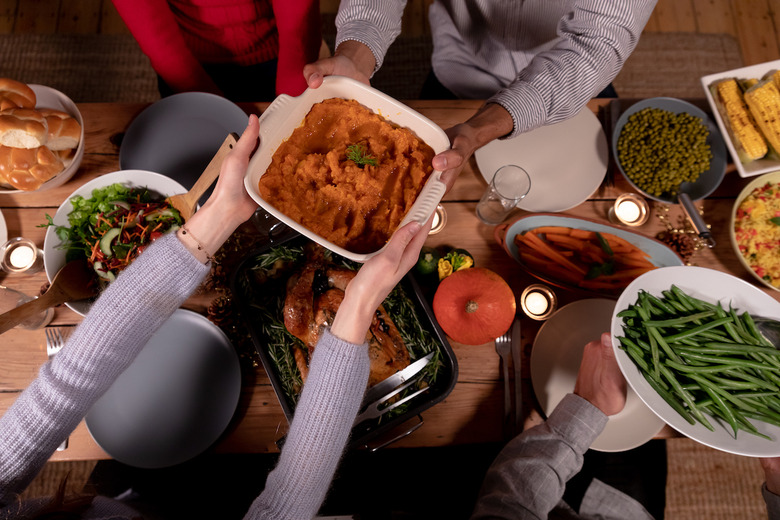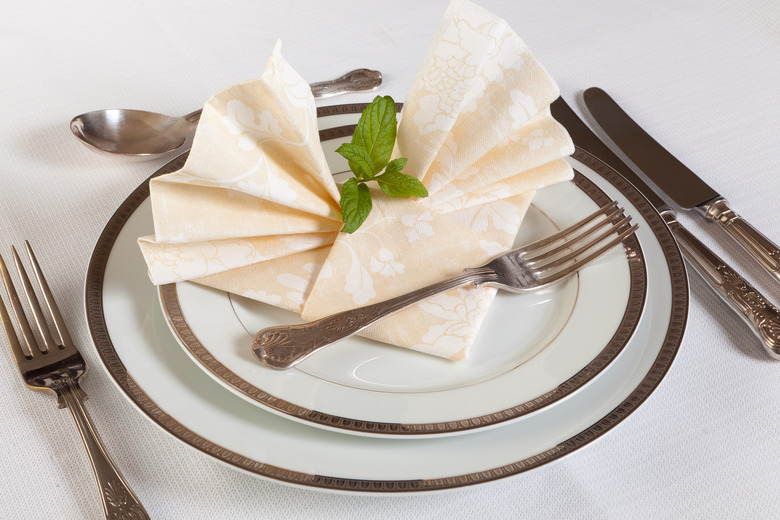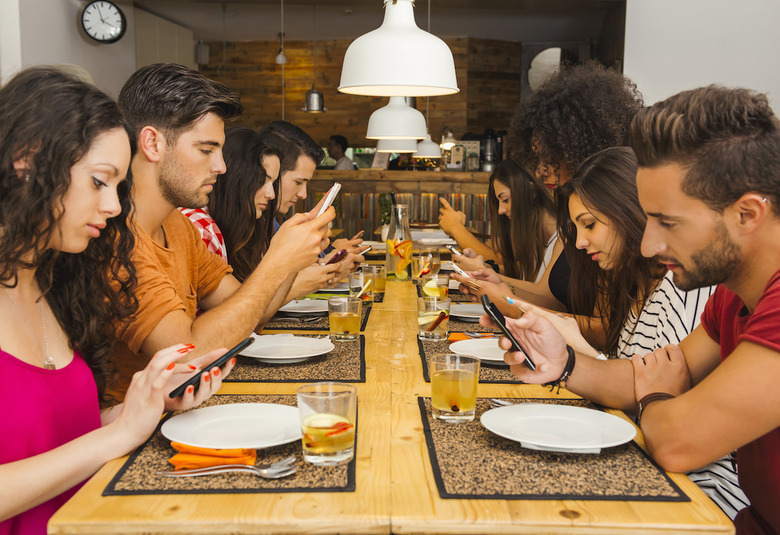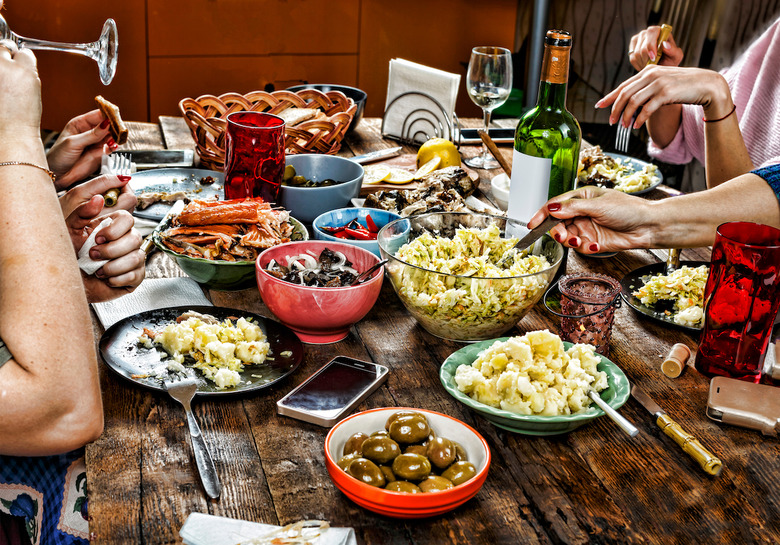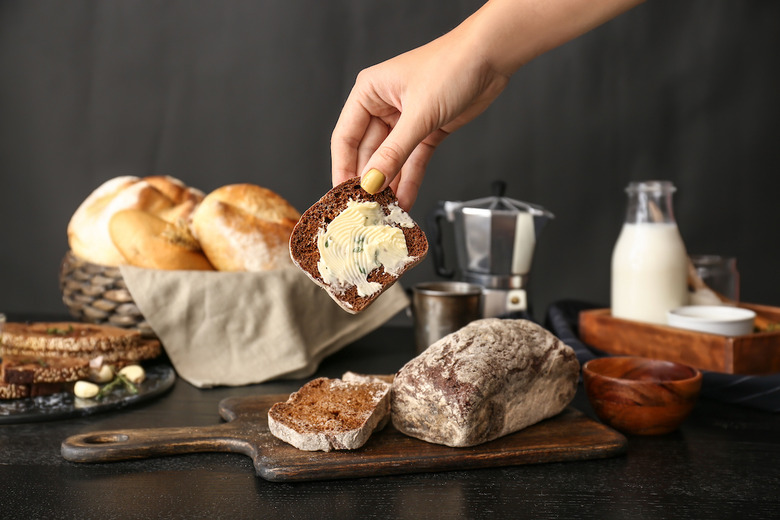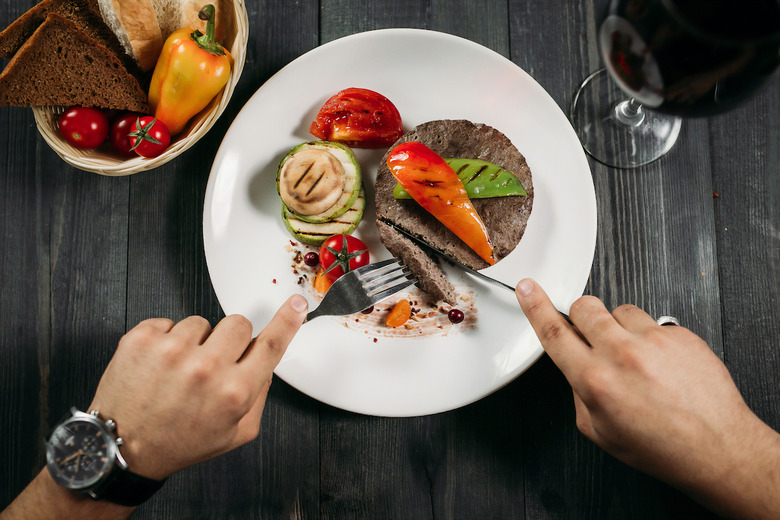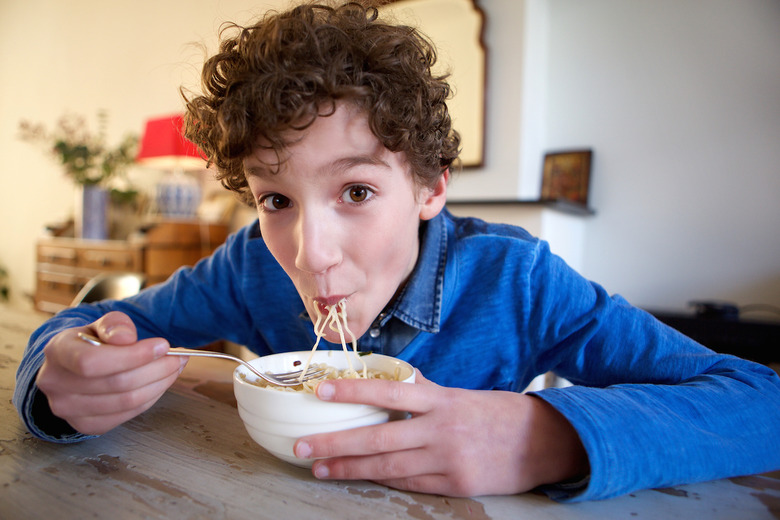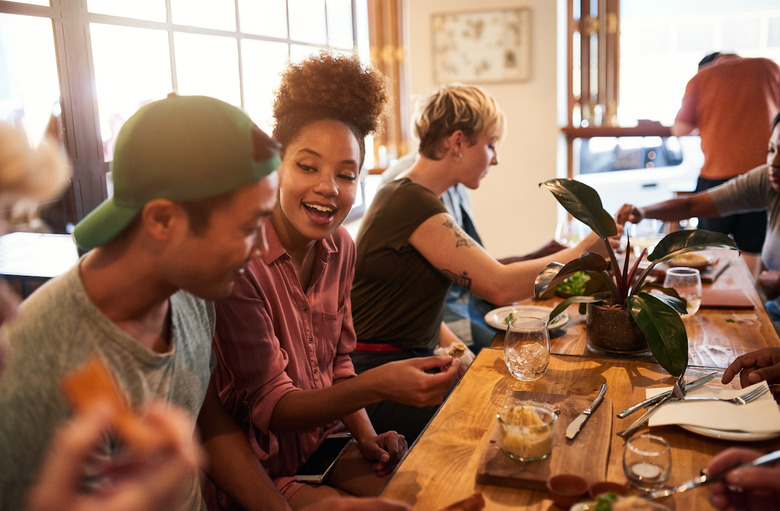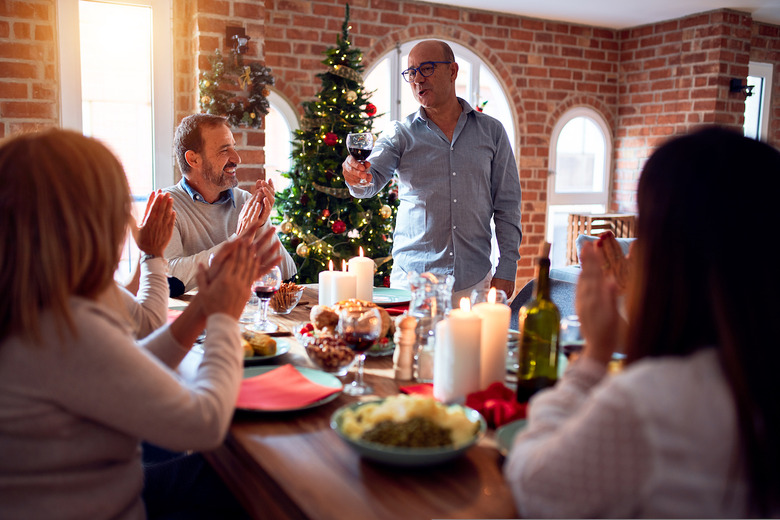Dining Etiquette Rules That Should Make A Comeback
These days, meals are often dine-and-dash affairs. We snatch a latte and a muffin and call it breakfast, grab burgers in drive-thrus or maybe cook a quick and easy dinner and scarf it down while watching the news. But there are still 24 hours in each day, and you're doing yourself a favor if you slow down, breathe a little and actually enjoy your meal. It's unlikely that we'll ever return to the Emily Post-directed era of shrimp forks and place cards, but here are some mannerly mandates from the past that we wouldn't mind seeing make comebacks.
Properly set the table
Long gone are the days of retro appetizers, where you needed different forks for oysters Rockefeller and escargot. But do take the time to lay out dinner plates with the fork nestled on a napkin on the left, and spoon and knife on the right. You can remember that by knowing that "fork" has four letters like the word "left," and "spoon" and "knife" each have five, as does the word "right."
Dress decently
If you're in the comfort of your own home, dress however you desire. But for a sit-down dinner of any importance, know the rules of dress code. Skip the ripped jeans, baseball hats and flip-flops.
Don’t start eating as soon as you’re served
Anyone who's ever dined in a restaurant with a large group of friends knows that all the dishes don't come out of the kitchen at the same time. But don't grab your fork and chow down as soon as your specific order arrives. It's not necessarily true that you need to wait for everyone to receive their main course before you tuck in — that's a prime way for some dishes to get disturbingly cold. Wait a few minutes and perhaps check with the waiter if one dish isn't arriving. And if you're the one still waiting for your meal while others sit fidgeting with theirs untouched, encourage them to start — that's one of the easiest ways to be more polite.
Keep your elbows off the table while eating
Keeping your elbows off the table while eating has been a top rule of etiquette for decades. According to Emily Post, it is not proper to slouch or lean on your elbows while eating. It just looks sloppy. However, it is OK to place your elbows on the table between courses while chatting with your fellow diners.
Skip the politics talk while eating
Old-fashioned etiquette rules advise diners to keep mealtime conversation light, and for good reason. Not everyone seated around a table wants to dig into today's divisive political issues, whether it's your preferred presidential candidate or views on any hot topic. There is a time and place for political chatter, and it's not usually over Easter dinner with Grandma.
Handle special diet requests thoughtfully
There are tons of trendy diets out there from keto to plant-based to paleo. People also have dietary sensitivities and allergies. It may feel awkward or antiquated, but if you have a special dietary need, talk to your host well before the meal — not as the dishes are being plated — and let them know about your situation. It's also polite to offer to bring your own dish to share with the group if you have a highly specific need.
Hold wine glasses by the stem
You don't have to be a wine connoisseur to understand why you should hold your wine glass by the stem. Clasping the glass by its stem protects the wine's temperature, whereas holding it by the bowl unwittingly warms the wine and makes smudged fingerprints more visible. If you happen to hold your wine glass by the bowl, don't sweat it. After all, this is one of the most common dining etiquette mistakes.
Ask for dishes to be passed, don’t reach across people
You've almost certainly heard "pardon my reach" when someone stretches across a table to grab another piece of bread or the gravy boat. But nobody likes to have a hand in their face, and reaching for something far from you is a surefire way to knock over other dishes on the table and make a mess. Don't reach for those deviled eggs that are six chairs away. Ask, and you shall receive.
Use cloth napkins
Modern times are all about getting rid of single-use products, like switching to metal straws or buying eco-friendly items at the grocery stores. So swapping cloth napkins for paper ones is ripe for a comeback. Yes, they need to be washed after a meal, but they look and feel better, and cloth napkins will never rip when you're dabbing up that spilled lemonade. Just make sure you know proper napkin etiquette.
No phones at the table
It wasn't long ago that none of us had phones in our pockets, and our lives were both better and worse for it. One of the basic rules of etiquette is that you keep your belongings off the table, and that applies to cell phones too. Unless you're a transplant surgeon on call, slide that phone into theater mode and keep it out of sight. Your Twitter feed can wait.
Don’t take more than your share
One of the etiquette rules your grandma wishes you knew is "FHB," or "family hold back." This means members of the hosting household should only take a little of each dish until it's clear there's enough to go around. We don't need to bring back saying "FHB," but it wouldn't hurt to think it, especially when the dessert tray is making the rounds.
Don’t touch food you’re not going to eat
Don't manhandle every piece of bread in the breadbasket. Nobody wants to be stuck with a biscuit you put your hands all over — that's one of the daily habits that are making you sick. Parents used to snap, "you touch it, you take it," and that's not a bad saying for today's diners, either.
Don’t use your fork as a shovel
Using a fork may seem like one of those manners every parent should teach their kids, but you'd be surprised by how some folks eat. It's not proper to use this utensil as a shovel or a spear. Gently pick up a small piece of food with the fork's tines and maneuver it smoothly to your mouth. Just don't pile it high like you're playing edible Jenga.
Cut only one or two pieces of food at a time
While we're on the fork-and-knife topic, don't go crazy chopping up your steak all at once. Old-school etiquette dictated that you should cut only one or two pieces of a large food item at once, eat them, then cut more as needed. Cutting an entire pancake into teeny bites makes it look like you're about to feed a toddler.
No slurping
As international travelers will tell you, etiquette varies greatly by country. In Japan, it's considered rude not to slurp your ramen or other noodle dishes. When in Japan, do as the Japanese do, but if you slurp in America, you're going to get stares.
No nose-blowing at the table
You can't turn off your personal bodily needs while dining, but some of them can wait until you excuse yourself. If you need to blow your nose, excuse yourself from the table and do so in the restroom. With the exception of choking, performing any bodily function like burping, coughing or sneezing at the table is just one of the ways you didn't know you were being rude.
Engage in dinner conversation
It's easy to just want to quietly sit at the table and eat your meal, but the most polite people know that it's proper etiquette to engage in light and friendly conversation over dinner. If you're among strangers and don't know where to start, consider brushing up on how to make small talk like a pro.
No eating off others’ plates
Maybe you really want to try your friend's super sweet dessert, and they're fine with it, too. No matter what you do, don't reach your fork over to their plate and help yourself. Etiquette maintains that it's the job of the person sharing their grub to cut a slice or piece for you and deposit it on your plate, where you'll try it out with your own utensil.
No licking your fingers
There are many sticky, sloppy, sumptuous sauces and foods that come out of a kitchen. But if you end up with barbecue sauce on your hand or a little bit of gravy at the bottom of your bowl, refrain from the desire to lick your fingers clean, no matter how tempting.
Don’t blow on food to cool it
Sometimes your soup or warm beverage is just too hot to consume right away. Blowing on such a dish would seem like a normal thing to do, but refrain and adopt the habits of the healthy. Simply stealthily stir the liquid around — it may not seem like it, but you're helping it cool down without blowing your own germs across the table.
Chew with your mouth closed
If there's one dinner rule you remember mom or dad harping on, it's probably to chew with your mouth closed. No one wants to see a mouthful of burger or Brussels sprouts. If you really have something you want to say, wait until you're finished with your bite to converse.
Pass the salt and pepper together
Think of salt and pepper as a matched set. It's traditional etiquette to pass both salt and pepper together, even if someone has only asked for the salt. And seasoning your food liberally is one of those cooking hacks your grandma knew.
Don’t just leave the table, excuse yourself verbally
You're done eating, so it's time to bail, right? Not so fast. Parents used to teach their children to ask, "may I be excused?" before they were allowed to leave a family dinner. Adults usually don't need to ask permission, but it's considerate to say something — even if just "excuse me," before wandering off.
Always thank the host and cook
However you express your appreciation, there's no better time to do it than after a meal has just been prepared and served to you. Even if you didn't love the fish course, or thought the soup could've used some more spice, a heartily delivered "thanks" and a little specific praise for your favorite item goes a long way toward earning you a return invite.
Offer to help clear or wash dishes
You'd never wander away from an at-home meal without offering to help clean up, right? Whether it's clearing the dishes, washing the dishes, putting away leftovers or shaking out the tablecloth, there are dozens of little jobs after a big dinner party or family meal. You don't have to do them all, but an offer and a few minutes spent helping out means a lot. After all, that is one of the things the best guests do.
More from The Daily Meal:
Etiquette Mistakes You Need to Stop Making by Age 30
Don't Break These Unspoken Rules as a Houseguest
How Much to Tip When Traveling Abroad
